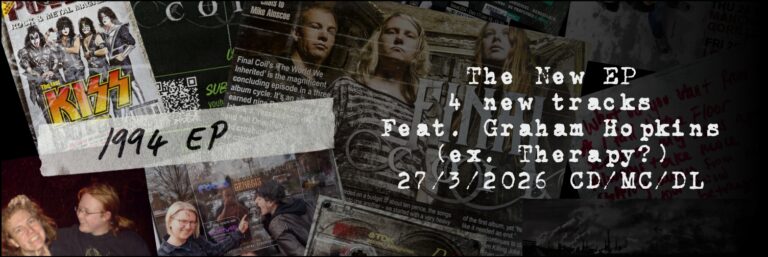
Dropped, with minimal fanfare, via the band’s Bandcamp page in November 2024 (and with a physical releases slated for 20125), Liminal Animals is Ulver’s 13th full-length album. Haunted by the tragic passing of keyboardist and sound designer Tore Ylvisaker, and beautifully produced (as we have come to expect from Ulver), the album proves treacherous and, the further you slip into the warm waters with which the band surround you, the more you find there’s a bitterly cold undercurrent beneath the surface, drawing you ever deeper into the unknown and out of your depth – a sense the band themselves may have been feeling as they worked their way through the sessions. It makes for unpredictable listening and, for every moment of blissful electro-pop, there’s something rather harder-edged gleaming dimly in the album’s darker recesses.
Not that you’d know it from the outset. Liminal Animals opens with the gleaming synth-pop of Ghost Entry, which nods to the flawless beauty of The Assassination Of Julius Caesar. With Kristoffer Rygg’s haunting vocals and enigmatic lyrics the centrepiece of this pristine production, it’s a beguiling start that seeks to beckon the listener over the threshold, entering of their own volition, only to find it harder to leave than they ever imagined. It’s followed by A City In The Skies, which finds Kristoffer layering his prog-infused vocal harmonies over rhythmic synths and glacial beats. Yet, for all the rich melodicism of the music, a darkness remains and, as Kristoffer warns that “all the children have gone insane”, so elements of stabbing industrial slowly intrude upon the track, letting us know that there’s a bitter centre awaiting anyone who attempts to scratch away the gleaming surface. It concludes in a wash of feedback, a moment of orchestrated chaos that chills to the very bone, before the jazzy rhythms and light-touch bass of Forgive Us appear to take us back to safer ground. Yet, while the track is rooted in the electronica of the last few albums, the lonely sound of a trumpet (played by world famous trumpeter Nils Petter Molvær) and ambient flourishes seek to recall the wondrous Perdition City, neatly demonstrating that Ulver have no intention of making things too easy for the audience to follow, even at this stage in their career.
With that thought in mind, the album takes another left turn with the wheezing synths of Nocturne #1, a strange piece of music that sounds like the soundtrack to a Kubrick film played on a turntable with an unstable power supply. A slowly expanding ambient track that progresses at its own somnolent pace, it weaves its web around the listener over the course of six-and-a-half minutes before giving way to the minimalist electronica of Locusts– a skittish piece that is closer in spirit to something Thom Yorke might produce than the more opulent sounds of Ulver’s recent fare.
Having drawn the listener into a different realm, Ulver offer up the ominous pulse of Hollywood Babylon, all red neon glistening on wet pavements seen from the window of a sealed and speeding car. Driven by a John Carpenter bassline, the track savages the wanton capitalism and egregious excesses of American culture, concluding that “you never know who’s watching you, no one will get away, don’t fuck with America, they’ll shoot you anyway, you have the right to protect yourself.” And, with that, as the mechanical sound of bolts being drawn slips into the percussive matrix, the track edges ever further into darkness, for all the soaring beauty of the vocals. With a heavier bassline still, The Red Light finds Ulver subverting the sounds of 90s rave for their own diabolical purposes, the opening lyic of “the world is burning” proving almost unbearably prescient in the light of recent events in LA, were it not sung with such a poignant sense of regret.
Bringing the pace right down, Nocturne #2 finds Ulver returning to John Carpenter as a source of inspiration, this time via the creeping bass of Ennio Morricone. A remarkably atmospheric piece of music, with Floydian elements embedded in its DNA, it feels like someone synced an offcut from Momentary Lapse Of Reason up to The Thing, the track increasingly evoking the glacial landscapes of that eerie sci-fi flick as it progresses.
The album concludes with the 11-minute Helian (Trakl), which is arguably the most enigmatic piece of this endlessly varied set. From an opening that finds Ulver contemplating the otherworldly wonders of Dead Can Dance, albeit with Lisa Gerard’s haunting vocals replaced by sanguine, spoken-word vocals (Jørn H. Sværen reading a poem by Georg Trakl), it slowly expands to incorporate the evil-minded guitars of Massive Attack’s Mezzanine and the otherworldly ambience of Enigma. Like a movie with an open-ended conclusion, it leaves the listener wondering where this most mercurial of bands can possibly head next, and you end the album anxious to listen again in an effort to better understand the impulses that drove its creation.
A band ever unwilling to stay still, Ulver remain an intensely creative unit. On Liminal Animals, they seem to delight in playing with expectations. Moments, for sure, nod to the synth-pop of The Assassination Of Julius Ceasar and Flowers Of Evil but, for every moment that appears to take refuge in safety, there is another drawing you into the dark streets and smoky bars of Perdition City. With elements of jazz, darkwave, trip-hop, and even industrial appearing across the record, it is one of the band’s most enigmatic offerings, and it is all the better for it. Ulver remain a glorious mystery, and Liminal Animals is an album that will potentially take years to fully unravel. 9.5/10



